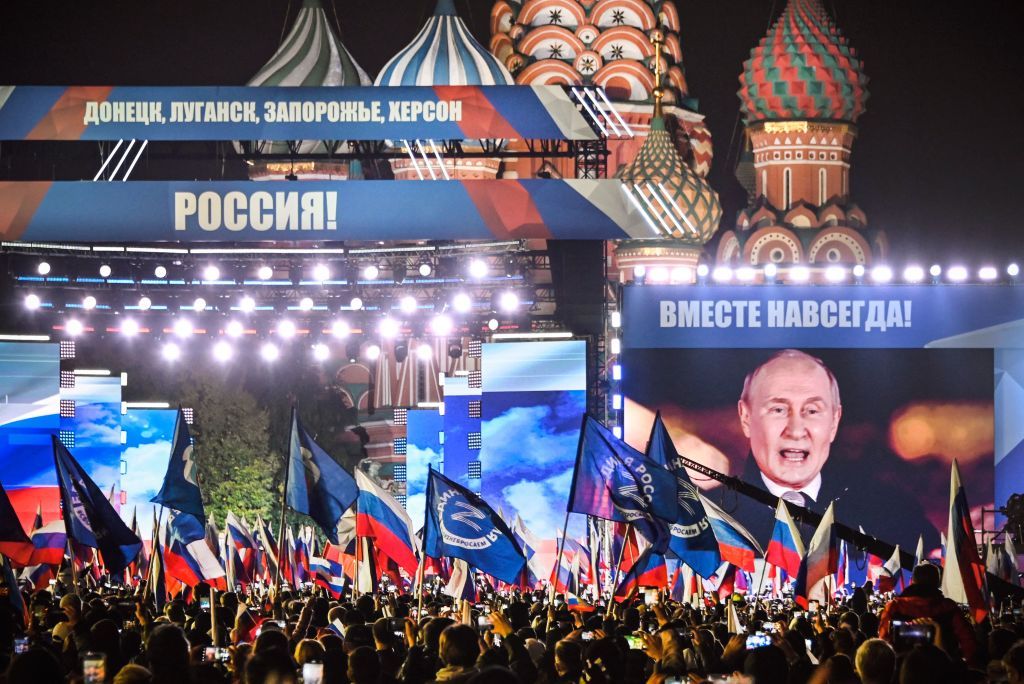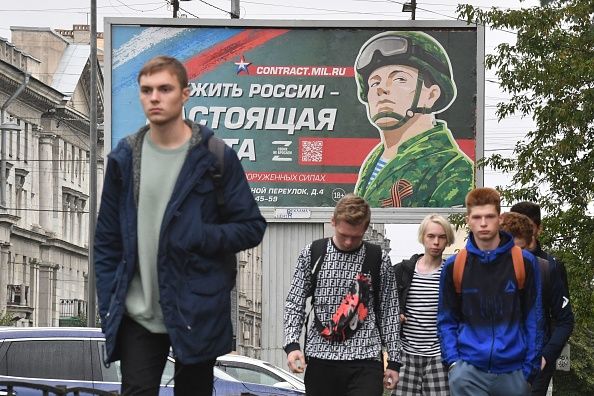Belarus Weekly: Turkey helps Russia, Belarus evade sanctions, leak documents allege

Belarus dictator Alexander Lukashenko meets in Minsk with the head of Russia’s proxies in occupied parts of Donetsk Oblast, offering to provide industrial and agricultural assistance.
Meanwhile, Minsk continues to propel Moscow’s nuclear rhetoric, claiming that Belarus has the equipment, aircraft, and sites necessary to accommodate Russian nuclear weapons.
The International Ice Hockey Federation says it will likely ban Russian and Belarusian players from its tournaments for the duration of the war – a move that contrasts the International Olympic Committee’s recent recommendation to allow these athletes to participate in international sporting events.
Belarusian authorities lay additional charges against Belarusian journalist Raman Pratasevich, accusing him of “repetitively forming and leading an extremist group.”
The new politically motivated case could see Pratasevich, held hostage by the regime, convicted for up to 25 years in prison.
International credit ratings agency Fitch Ratings affirms Belarus’ status as “Restricted Default” amid Minsk’s failure to repay Eurobond obligations in the proper currency.
Turkey has helped both Russia and Belarus evade Western sanctions, according to leaked U.S. intelligence documents.
Lukashenko meets in Minsk with Russian Donetsk Oblast proxies
Lukashenko met in Minsk on April 18 with Denis Pushilin, the leader of Russia’s proxies in occupied Donetsk Oblast.
Lukashenko allegedly asked Pushilin how Minsk could provide so-called “assistance,” according to Belarusian state media.
While Lukashenko did not publicly propose military aid, he spoke of the need to “revive industrial enterprises, (and) agriculture” in the region.
Ukraine’s Foreign Ministry recalled its ambassador from Minsk following Lukashenko’s meeting with Pushilin, issuing a statement that called the meeting “an attempt to legitimize this representative of the Russian occupation administration in Donetsk.”
Mykhailo Podolyak, an advisor to Ukraine’s Presidential Office, dismissed Lukashenko’s meeting, calling Pushilin the “leader of a criminal enclave that will cease to exist as a result of this war.”
Pushilin is under both international and Ukrainian sanctions.
While Belarus has not officially recognized the Russian proxies in occupied Donetsk and Luhansk oblasts, Lukashenko’s regime has claimed it would do so upon the Kremlin’s request. Pushilin visited Minsk in July 2022, but this is the first time he has met with Lukashenko.
Lukashenko’s regime is a co-belligerent in Russia’s war, having allowed Belarusian territory to be used as a launching pad for Russian attacks on Ukraine.
In mid-April, Lukashenko told Russian Defense Minister Sergei Shoigu that he wanted Russia to defend Belarus “as its own territory” if the country was attacked.
Politico: Turkey helps Russia, Belarus evade sanctions
Turkey has helped both Russia and Belarus evade Western sanctions, according to leaked U.S. intelligence documents. The authenticity of the documents couldn't be verified.
According to the classified document, which was one of several leaked on social media over the past few weeks, “Turkish companies purchased sanctioned goods” and “sold them in European markets.”
Meanwhile, the document also says that the involved companies “resold goods from Europe to Russia.”
Another such document alleged that Ukraine’s Security Service (SBU) was behind the attack on the Russian aircraft at Machulishchy Airfield in Belarus in December.
While the Pentagon has confirmed the leak, the degree of veracity of the documents is contested, as some appear to have been doctored. On April 13, the Federal Bureau of Investigation (FBI) arrested 21-year-old Jack Teixeira for allegedly having leaked classified intelligence via Discord.
Belarus’ Defense Ministry confirms readiness to host Russian nukes
Belarus is prepared to host Russia’s strategic nuclear weapons, Belarusian Defense Minister Viktor Khrenin said in a statement on April 14.
According to Khrenin, Belarus has prepared the necessary equipment, aircraft, and sites needed to accommodate nuclear weapons. He noted that if the West’s so-called “hostile rhetoric continues,” Belarus will “respond to force with force.
On March 25, Russian President Vladimir Putin threatened to place tactical nuclear weapons in Belarus for alleged training purposes – the latest in a series of nuclear threats by the Kremlin. He noted that a “special storage facility” for the weapons would be ready by July 1.
Putin also boasted that Russian aircraft and Iskander missile systems capable of carrying nuclear weapons are already in Belarus. He said the move was part of an agreement with Lukashenko, who he claims has long requested tactical nuclear weapons be placed in Belarus.
Western leaders have expressed concerns, calling Putin’s nuclear rhetoric “dangerous and irresponsible.”
Meanwhile, Belarus’ Defense Ministry claimed on April 14 that combat readiness checks of the country’s Western Operational Command have indicated that it now comprises of 6,000 people. The ministry said similar checks are ongoing across other military branches.
Belarus announced an additional inspection of troops’ combat readiness on April 4 at Lukashenko’s request. Several local media outlets have suggested that men have been covertly conscripted in the country’s Brest and Hrodno regions.
International Ice Hockey Federation likely to ban Russia, Belarus from tournaments for duration of war
Russian and Belarusian players will likely be banned from participating in International Ice Hockey Federation (IIHF) tournaments for the duration of Russia’s war, ESPN reported on April 16.
According to ESPN, Russia, and Belarus have already been banned from the organization’s tournaments through 2024. An official decision will be made on extending the ban to 2025.
“I hope Russia and Belarus will come back as soon as possible because it will mean the war is over,” IIHF President Luc Tardif said during a press conference.
Tardif went on to say that the decision was a “question of security” for both hockey fans and teams and that “nobody knows how long it's going to take” for the situation to shift back.
The Russian Hockey Federation called Tardif’s comment about security concerns a “contrived reason” to keep their players out of IIHF competitions.
The IIHF’s decision contrasts that of the International Olympic Committee (IOC), which recommended in late March to allow Russian and Belarusian athletes to take part in international sporting events.
Belarusian journalist Raman Pratasevich faces up to 25 years in prison
The Minsk regional court has laid a new felony charge against Raman Pratasevich, a former editor for Belarusian opposition Telegram channel Nexta, and Yan Rudzik, one of the channel’s founders. If convicted, they face up to 25 years in jail.
Belarusian prosecutors have accused Pratasevich and Rudzik of “repetitively forming and leading an extremist group” for heading another Telegram channel – Belarus Golovnogo Mozga (Belarus of the Brain) which is critical of Lukashenko’s regime.
Pratasevich’s trial began on Feb. 16, during which he was accused of creating and participating in a so-called “extremist group,” undermining national security, and other politically motivated charges. Nexta founders Stsiapan Putsila and Yan Rudzik were tried in the same case, albeit in absentia.
Nexta extensively covered the protests that followed the fraudulent Belarusian presidential election in 2020.
Pratasevich fled Belarus but was detained when his commercial flight from Athens to Vilnius was forced to land in Minsk while flying over the country. His then-girlfriend, Sofia Sapega, was also detained after the flight and is serving a six-year prison term in Belarus. A Russian citizen, she agreed on April 12 to be extradited to Russia.
On July 19, 2022, the International Civil Aviation Organization (ICAO) found Belarus guilty of orchestrating the forced landing of Ryanair Flight FR4978. According to the ICAO, forced landings constitute an offense under the Montreal and Chicago conventions.
Fitch Ratings assigns Belarus ‘Restricted Default’ rating
Fitch Ratings, an international credit ratings agency, affirmed on April 14 Belarus’ Long-Term Foreign-Currency (LTFC) Issuer Default Rating (IDR) as Restricted Default (RD).
In late June, Belarus’ National Bank announced that the country would cover dollar payments in Belarusian rubles.
Among the key rating drivers are the payment of U.S. dollar Eurobond obligations by Belarus in Belarusian rubles, as well as expectations of further recession, the “lagged effect of currency depreciation and relatively loose monetary policy,” and “high geopolitical risk” amid Belarus’ involvement in Russia’s full-scale war against Ukraine.
Fitch Ratings’ assessment expects a further recession in Belarus amid Western sanctions, with a forecasted GDP decrease of 1.3% in 2023 and 0.3% in 2024. The rating agency also anticipates the country’s inflation to remain high, averaging 8.7% in 2023 and 9.5% in 2024.
Lukashenko’s ‘witch hunt’ for for Telegram channel bloggers
The Spotlight segment provides readers with the historical context of contemporary events in Belarus.
Belarusian authorities laid additional politically motivated charges againsе blogger Raman Pratasevich, held hostage in Belarus. The news made international headlines.
A former editor of Belarusian opposition Telegram channel Nexta, Pratasevich and the channel’s co-founder Yan Rudzik may face up to 25 years in prison for allegedly “repetitively forming and leading an extremist group.”
Nexta (“someone” in Belarusian) was founded in 2015 by then-17-year-old blogger Stsiapan Putsila. It kicked off as a YouTube channel with a song cover titled “Vybora nyet” (“No choice”) – a reference to the lack of free and fair voting during the 2015 Belarusian presidential election.
The Nexta Telegram channel published videos that criticized Belarusian dictator Alexander Lukashenko’s regime on topics like the country’s elections, the death penalty, and protests over various government policies.
The channel went viral across Belarus in 2019 after publishing a video called “Lukashenko. Criminal Records,” which detailed the oppressions committed by Lukashenko’s regime.
Nexta extensively covered the protests that followed the fraudulent Belarusian presidential election in 2020. From Aug. 9 to 16 that year, Nexta’s Telegram channel audience grew from 427,000 to over 2 million subscribers, becoming the mouthpiece and coordinator for protests across the country.
As a result of its coverage of the election, the channel was labeled a so-called “terrorist organization” in April 2022 by Belarus’ Supreme Court. Merely subscribing to the Nexta Telegram channel could lead to detention by Belarusian authorities.
Pratasevich, Rudzik, and Putsila all face extensive criminal charges that have been deemed “politically motivated” by human rights watchdogs.
While Rudzik and Putsila are being tried in absentia, Pratasevich was detained when his Ryanair commercial flight from Athens to Vilnius was forced to land in Minsk while flying over the country.
He soon appeared in front of Belarus TV cameras with viable bruises and vocally supporting the regime and confessing to the regime's charges. He remains in Belarus to this day, appearing several times on Belarusian propaganda outlets.
One of the most popular communication platforms in Belarus, Telegram has served as a key tool for those who oppose Lukashenko’s regime. Nexta is one of the many oppositionist Telegram channels in Belarus, with their creators awaiting trial or serving long politically motivated sentences.
Among them is Ihar Losik, founder of a news/meme page Belarus Golovnogo Mozga.













